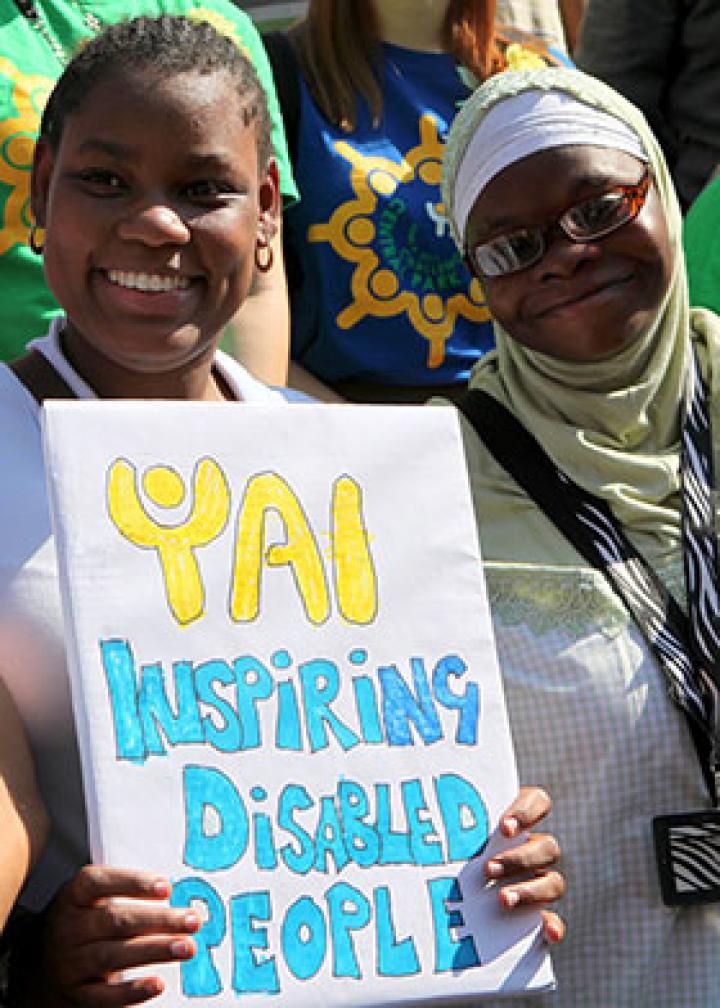Share
In honor of National DSP Recognition Week, Margaret Puddington delivered these remarks at a rally on the steps of City Hall on Friday, September 14.
Our son Mark, nearly 32 years old, is a sunny, happy person with a great talent for making friends. Mark also has significant developmental disabilities; he has cognitive and physical challenges and is not able to speak. Every task of daily life is an enormous struggle for him, whether it’s cutting up his meat or buttoning a shirt. Mark cannot protect himself from cars on the street, from an aggressor, or from a fire. He cannot ever be left alone, not even for a few minutes.

Mark lives in a small group home and attends an adult day program, both funded by the Office for People with Developmental Disabilities (OPWDD). He is dependent on his direct support staff for his health and safety and for just getting through the day. Staff help him to learn new skills but do for him the things he cannot do for himself. They tie his shoes, accompany him to doctors’ appointments, and bathe him. They also laugh with him, encourage him, and calm him when he is frightened. Mark relies on his remarkable staff every hour of every day. They are his teachers, his caregivers, his advocates, his friends. And when my husband and I are no longer around, they will be Mark’s family.

Parents and family members are acutely sensitive to the importance of the job direct support staff perform. After all, we’ve been doing that job ourselves for twenty, thirty, even forty or more years. In our eyes, there is no more important work than supporting our children in the many diverse ways that are essential to their well-being. We know how challenging this work is. That is why, to us, the entire service system is only as good as the direct support staff. Aside from the families, it is the direct support staff who determine whether our children will enjoy their lives or be neglected, whether they will learn new skills or languish. Direct support staff hold the quality of our children’s lives is in their hands.
You already know that direct support staff must often assist with, or perform, such tasks as bathing, toileting/diaper changing, feeding, dressing, and tooth brushing. And you know that direct support staff teach people daily living skills, such as personal hygiene, simple cooking, and housekeeping skills. But you may not be familiar with the full breadth of what direct support entails. Here are just a few examples:
• Administering medications
• Performing other daily nursing tasks, which may include insulin injections, g-tube feeding, or catheter insertion
• Physically lifting people who are nonambulatory into and out of wheelchairs, sometimes lifting each person many times daily
• Utilizing specialized technology such as motorized wheelchairs, lifts, and hearing aids
• Working knowledgeably with people with highly specialized needs, such as those who are blind, deaf, autistic, or nonambulatory
• Carrying out occupational and/or physical therapy instructions, such as positioning for eating, transferring for bathing, and performing simple strengthening exercises
• Handling chronic challenging behaviors and behavioral crises

This work requires complex skills, To do these things, and to do them well, direct support staff need extensive training, both pre-service and on-going. They rely upon their supervisors to help them to develop needed skills and to provide guidance in times of frustration.
It’s offensive to us families that the job of direct support is generally not given the respect it deserves. It is not a low-level job; it is a profession, which requires intelligence, a thorough understanding of the population, good communication skills, good teaching skills, good interpersonal skills, good problem-solving skills, and huge amounts of on-going training. Plus compassion and a generous heart.
Taking all this into account, you would expect that direct support staff would receive decent salaries, right? Well, they do not. Most staff work 2 or 3 jobs just to make their rent. Sadly, many are forced to leave the field for higher paying jobs, and it is difficult to attract qualified new staff, particularly in decent economic times. When staff leave, many individuals—especially those with no other family—experience painful personal loss.
Families believe that direct support staff must be valued as professionals and compensated appropriately for the important and challenging work they do. Thus 11 years ago, families across NYS joined together to create the Coalition of Families for Direct Support Staff. The purpose of the Coalition is to advocate for salary increases for direct support staff in voluntary not-for-profit agencies. We support other reforms, too, such as career ladders, tuition assistance, and so on, but we believe the salary increases are absolutely indispensable. Over the last decade, we’ve made modest progress in raising salaries, but all that has come to a screeching halt in these recession years. We families aren’t giving up our advocacy efforts, though. We are just in a temporary holding pattern.
***
I used to be afraid that Mark would outlive me. I worried about who would care for him, who would understand him and respect his feelings, who would comfort him, who would love him.
Now I know.

There are no words to thank you enough, you wonderful people with the white flowers, for the magnificent job you do, for the enormous life-changing impact you have on people’s lives.
On behalf of the thousands of families who want to express their gratitude to you: we thank you from the bottom of our hearts.
